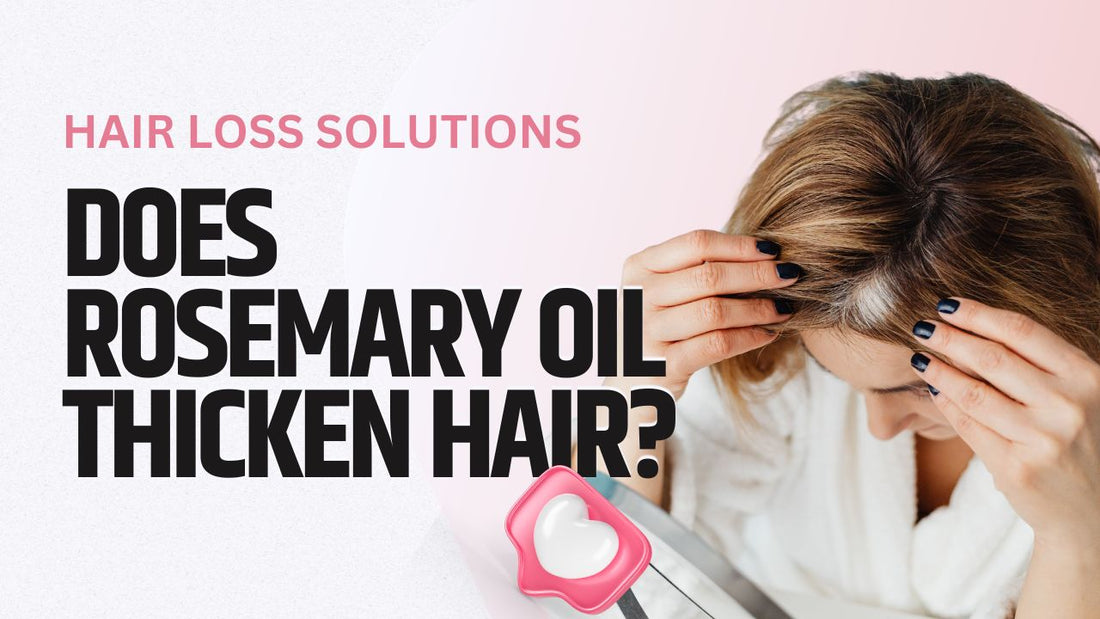
Does Rosemary Oil Thicken Hair?
Share
In today's era of wellness, natural remedies have reemerged as a sought-after solution for many health and beauty concerns. Among these, rosemary oil stands out, not just as a fragrant herb in our kitchens, but as a potential elixir for our hair. The real question that many are asking is: does rosemary oil truly thicken hair?

Historical Use of Rosemary in Hair Care
Venturing back in time, rosemary has a storied history, rich with tales of its therapeutic use. Ancient civilizations, ranging from the Egyptians to the Romans, revered rosemary not just for its aromatic presence in cuisine but for its purported benefits to hair health.

Historical texts and oral narratives abound with mentions of rosemary being used to darken graying hair, improve shine, and even combat dandruff. It's fascinating to see how something as seemingly simple as an herb has retained its reputation across millennia. However, are these age-old tales backed by contemporary science?
The Science Behind Rosemary Oil
Nature is a complex, intricate tapestry, and rosemary oil is no exception. Boasting a myriad of active compounds, rosemary oil's impact on hair health isn't due to just one, but a combination of these elements.

Dihydrotestosterone (DHT) and Hair Thinning
One of the primary culprits of hair thinning in both men and women is Dihydrotestosterone (DHT), a potent form of testosterone that, unfortunately, isn't hair's best friend. Elevated levels of DHT have been linked to reduced hair follicle size and a shortened hair growth cycle.
But here's where rosemary oil enters the scene: research suggests that some compounds in rosemary oil might inhibit the production of DHT. This means that regular application could potentially counteract the hair-thinning effects of DHT, providing a more natural approach to those looking to maintain a fuller mane.

Improved Blood Circulation
A healthy scalp is the foundation of lustrous hair. Blood flow plays a critical role in transporting oxygen and nutrients to hair follicles, ensuring they're nourished and primed for growth. Some studies indicate that rosemary oil, when massaged into the scalp, can enhance blood circulation. This heightened blood flow could foster a conducive environment for hair growth, potentially leading to thicker strands over time.

Antioxidant Properties
Our hair endures a lot: from environmental pollutants to the scorching sun, these external aggressors can inflict damage. Antioxidants are nature's shield against these harmful elements, and guess what? Rosemary oil is rich in them. By neutralizing free radicals – unstable atoms that can harm cells – antioxidants in rosemary oil can protect hair, ensuring it remains strong, vibrant, and less prone to breakage.
Comparative Studies: Rosemary Oil vs. Other Hair Treatments
No examination of rosemary oil's efficacy would be complete without juxtaposing it against mainstream treatments. There have been intriguing studies comparing the effects of rosemary oil with minoxidil, a widely recognized hair growth treatment. Some findings suggest that rosemary oil isn't just a mere alternative but could be on par with, if not superior to, certain over-the-counter solutions.

However, it's vital to approach these studies with a discerning eye. While promising, more extensive research is needed to definitively position rosemary oil as a front-line solution for hair thickening.
Application and Usage
Embracing rosemary oil's benefits requires more than a casual dab here and there. To truly harness its potential, one must understand the correct application methods and factors to consider.
Frequency and Duration
Consistency is key. For noticeable results, it's recommended to apply rosemary oil mixed with a carrier oil, like coconut or jojoba, 2-3 times a week. As with most natural remedies, immediate results may not be visible. It's advised to continue the regimen for at least a few months before assessing its impact.
Potential Side Effects
Nature is bountiful, but it's always wise to tread with caution. Before diving headfirst into any new treatment, conducting a patch test is paramount. This will ensure you aren't allergic to the oil. Some individuals might experience irritation or an allergic reaction, so always be vigilant and listen to your body.

How to Choose the Right Rosemary Oil
Delving into the world of essential oils can be a maze of labels, brands, and concentrations. When it comes to hair health, especially with a potent remedy like rosemary oil, choosing the right product is crucial.
Purity is Key
The first rule of thumb when picking rosemary oil—or any essential oil for that matter—is ensuring it's 100% pure. Some products might be diluted or mixed with other oils, which could reduce its efficacy. A genuine, high-quality rosemary oil will typically list 'Rosmarinus officinalis' as its primary ingredient.
Extraction Method Matters
The method used to extract the oil from the rosemary plant can greatly influence its quality. Steam distillation is the gold standard, ensuring the oil retains its beneficial compounds without any chemical contamination.
Organic vs. Non-Organic
While both organic and non-organic rosemary oils can offer benefits, opting for an organic variant ensures you're steering clear of any pesticides or herbicides that might linger in the product. It's a step forward towards a more natural and clean approach to hair care.

Real Experiences: Testimonials and Case Studies
Every individual's hair journey is unique, making it vital to consider personal experiences when assessing a remedy's effectiveness. Over the years, many have turned to rosemary oil in hopes of revitalizing their locks.
Positive Outcomes
- Jane, 35: After months of noticeable hair thinning, Jane turned to rosemary oil as a natural remedy. With consistent application over six months, she observed not only a reduction in hair fall but a noticeable improvement in hair volume.
- Rahul, 28: Battling early signs of a receding hairline, Rahul combined rosemary oil with his regular shampoo. The results? A halt in hair recession and even some new growth along the hairline.
Mixed Results
- Liam, 42: While he experienced a softer hair texture and reduced dandruff, Liam didn't notice significant thickening after using rosemary oil for three months.
These testimonials underscore a vital point: while many find success with rosemary oil, individual experiences can vary. Factors like genetics, overall health, and consistency in application play a substantial role in determining outcomes.
Safety and Precautions
As with any natural remedy, it's paramount to approach rosemary oil with informed caution.
Skin Sensitivity
Before incorporating rosemary oil into your routine, always conduct a patch test. This can help detect any allergic reactions or sensitivities.
Pregnancy and Rosemary Oil
Pregnant women are often advised to avoid certain essential oils, and rosemary is one among them. If you're expecting or trying to conceive, consult with a healthcare professional before using rosemary oil.
Interaction with Medications
Rosemary oil might interact with specific medications or conditions. Particularly if you're on blood-thinning drugs, have epilepsy, or have high blood pressure, it's crucial to seek medical guidance before incorporating rosemary oil.

Beyond Hair: Other Benefits of Rosemary Oil
While our focus has been on hair thickening, it's worth noting that rosemary oil is a multitasker. From skincare benefits, such as reducing acne and oiliness, to alleviating muscle pain and boosting mental clarity, rosemary oil truly is a jack of all trades in the wellness world.
The Science Behind Rosemary Oil's Effectiveness
For those who value empirical evidence, understanding the scientific rationale behind rosemary oil's potential benefits can be enlightening.
Active Compounds in Rosemary Oil
- 1,8-Cineole: This compound is known for its anti-inflammatory properties. Inflammation at the hair follicles can hinder growth, so reducing it can promote healthier hair.
- Camphor: Apart from its aromatic scent, camphor can stimulate blood flow to the scalp. Increased blood flow can nourish hair follicles, optimizing growth.
- Alpha-Pinene: This compound possesses antimicrobial properties, ensuring a cleaner, healthier scalp, which is conducive to hair growth.
Comparative Studies: Rosemary Oil vs. Minoxidil
One noteworthy study compared the effectiveness of rosemary oil to minoxidil, a popular over-the-counter hair growth product. The results? After six months, both groups experienced significant hair growth. While minoxidil had a slight edge in performance, rosemary oil users reported fewer side effects.
A Holistic Approach to Hair Care with Proactive Rosemary Hair Booster Oil
Understanding that hair health isn't solely about topical applications is pivotal. Incorporating "Proactive Rosemary Hair Booster Oil" into a holistic routine can maximize benefits.
- Balanced Diet: Essential nutrients like biotin, iron, and protein are foundational for robust hair health. Including these in your diet complements the external application of the booster oil.
- Stress Management: Chronic stress can be a hair growth inhibitor. Engage in relaxation techniques like meditation, deep breathing, or yoga to manage stress levels.
- Regular Scalp Massage: Using "Proactive Rosemary Hair Booster Oil" for scalp massages can enhance blood circulation, further amplifying its potential benefits. Its unique formulation not only provides the advantages of rosemary oil but also brings additional nutrients to the scalp, promoting healthier, thicker hair.

Conclusion: Embracing Nature's Solution with Proactive Rosemary Hair Booster Oil
Navigating the world of natural hair remedies can be daunting. The "Proactive Rosemary Hair Booster Oil" stands out as a blend that combines the benefits of rosemary with other vital ingredients, offering a comprehensive solution. Given its holistic benefits, minimal side effects, and the backing of both anecdotal and scientific evidence, it's a worthy addition to anyone seeking to improve their hair health.
FAQs
1. How often should I apply Proactive Rosemary Hair Booster Oil for hair thickening?
Most users find applying it 2-3 times a week sufficient. However, individual needs may vary, and it's best to start slow and monitor your scalp's response.
2. What sets Proactive Rosemary Hair Booster Oil apart from other oils?
The booster oil combines the benefits of rosemary with other potent ingredients, making it a comprehensive solution for hair care needs.
3. How long before I see results with the booster oil?
Typically, consistent users report noticeable benefits in 3-6 months. However, individual results can vary based on factors like genetics and overall health.
4. Are there any side effects to using Proactive Rosemary Hair Booster Oil?
While generally safe, some users might experience skin irritation. It's always recommended to do a patch test before a full-scale application.
5. Can I use the booster oil on color-treated hair?
Yes, Proactive Rosemary Hair Booster Oil is safe for color-treated hair. In fact, it can help maintain color vibrancy and overall hair health.
















